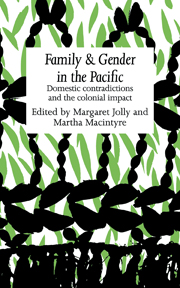Book contents
- Frontmatter
- Contents
- List of contributors
- Acknowledgements
- Map of main island groups of the Pacific
- Map of Papua New Guinea – Provinces
- Introduction
- 1 New England missionary wives, Hawaiian women and ‘The Cult of True Womanhood’
- 2 Changes in the lives of ordinary women in early post-contact Hawaii
- 3 Domestic structures and polyandry in the Marquesas Islands
- 4 The object lesson of a civilised, Christian home
- 5 Medical care and gender in Papua New Guinea
- 6 Suffer the children: Wesleyans in the D'Entrecasteaux
- 7 Women in contemporary Central Enga society, Papua New Guinea
- 8 Better homes and gardens
- 9 God, ghosts and people: Christianity and social organisation among Takuru Wiru
- 10 Sins of a mission: Christian life as Kwaio traditionalist ideology
- 11 Sacred spaces: churches, men's houses and households in South Pentecost, Vanuatu
- 12 Bond-slaves of Satan: Aboriginal women and the missionary dilemma
- Bibliography
- Index
10 - Sins of a mission: Christian life as Kwaio traditionalist ideology
Published online by Cambridge University Press: 05 November 2011
- Frontmatter
- Contents
- List of contributors
- Acknowledgements
- Map of main island groups of the Pacific
- Map of Papua New Guinea – Provinces
- Introduction
- 1 New England missionary wives, Hawaiian women and ‘The Cult of True Womanhood’
- 2 Changes in the lives of ordinary women in early post-contact Hawaii
- 3 Domestic structures and polyandry in the Marquesas Islands
- 4 The object lesson of a civilised, Christian home
- 5 Medical care and gender in Papua New Guinea
- 6 Suffer the children: Wesleyans in the D'Entrecasteaux
- 7 Women in contemporary Central Enga society, Papua New Guinea
- 8 Better homes and gardens
- 9 God, ghosts and people: Christianity and social organisation among Takuru Wiru
- 10 Sins of a mission: Christian life as Kwaio traditionalist ideology
- 11 Sacred spaces: churches, men's houses and households in South Pentecost, Vanuatu
- 12 Bond-slaves of Satan: Aboriginal women and the missionary dilemma
- Bibliography
- Index
Summary
More than half a century ago, on Malaita (Solomon Islands), Ian Hogbin encountered a striking juxtaposition between coastal villagers, staunchly committed to fundamentalist Christianity, and their kin and neighbours in the mountains above defiantly holding to the religion and ways of their ancestors (Hogbin 1939). In the 1980s a similar cleavage still prevails 40 miles to the southeast, where Christian villagers huddle at the foot of the mountain wall and fiercely traditionalist Kwaio in the mountains still sacrifice pigs to their ancestors. The juxtaposition and structural and political opposition of Christian and traditionalist communities, an anachronism even in Hogbin's day, provides an opportunity rare in seaboard Melanesia to assess the impact of Christianity synchronically and directly as well as diachronically and indirectly, from oral tradition and documentary evidence.
While many facets of this confrontation between the new and the old, the exogenous and indigenous, challenge interpretation (see Keesing 1967, 1982a), I shall here focus on the way the Christian presence is used by the traditionalists, particularly women, to interpret their own lives and culture and the changes of the last 60 years.
Although male ideologues have taken the lead in movements to codify kastom and gain partial cultural and legal autonomy in the colonial and post-colonial states (Keesing 1982b), women have had a special place in the articulation of Christian and traditionalist communities. The contrasts between the communities are defined by the traditionalists mainly in terms of the strict ancestral rules surrounding menstruation and childbirth, which they observe as a matter of life and death and which Christians systematically violate under God's protection.
- Type
- Chapter
- Information
- Family and Gender in the PacificDomestic Contradictions and the Colonial Impact, pp. 193 - 212Publisher: Cambridge University PressPrint publication year: 1989
- 9
- Cited by

